虚拟语气语法教案教学教材
高中英语语法教案- 虚拟语气
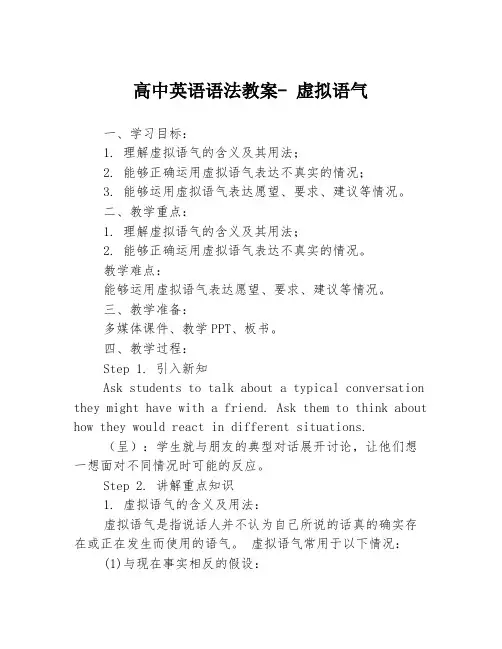
高中英语语法教案- 虚拟语气一、学习目标:1. 理解虚拟语气的含义及其用法;2. 能够正确运用虚拟语气表达不真实的情况;3. 能够运用虚拟语气表达愿望、要求、建议等情况。
二、教学重点:1. 理解虚拟语气的含义及其用法;2. 能够正确运用虚拟语气表达不真实的情况。
教学难点:能够运用虚拟语气表达愿望、要求、建议等情况。
三、教学准备:多媒体课件、教学PPT、板书。
四、教学过程:Step 1. 引入新知Ask students to talk about a typical conversation they might have with a friend. Ask them to think about how they would react in different situations.(呈):学生就与朋友的典型对话展开讨论,让他们想一想面对不同情况时可能的反应。
Step 2. 讲解重点知识1. 虚拟语气的含义及用法:虚拟语气是指说话人并不认为自己所说的话真的确实存在或正在发生而使用的语气。
虚拟语气常用于以下情况:(1)与现在事实相反的假设:If I were you, I would leave this job.(与现在事实相反的假设)If he had arrived earlier, he would have caught the flight.(与过去事实相反的假设)(2)表达愿望、虚构场景、要求、建议等情况:I wish I could speak German fluently.(表达愿望)If I were rich, I would travel around the world.(虚构场景)I suggest that you take a break and relax.(建议)2. 虚拟语气的形式:虚拟条件句:If I had time, I would go shopping.(如果我有时间,我就去购物了。
《虚拟语气教案》
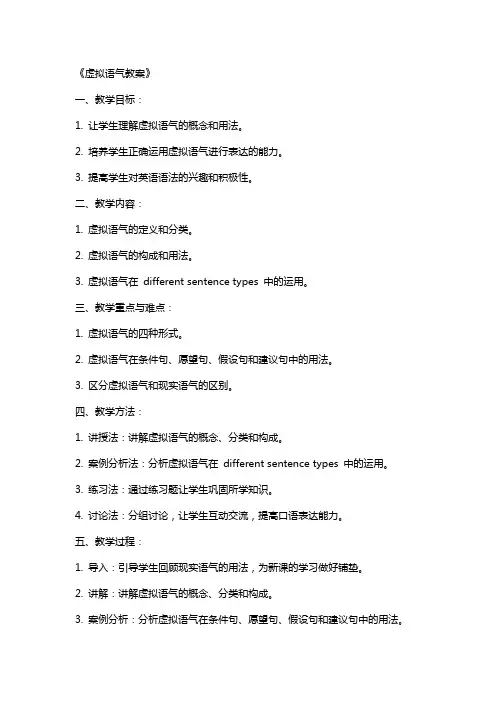
《虚拟语气教案》一、教学目标:1. 让学生理解虚拟语气的概念和用法。
2. 培养学生正确运用虚拟语气进行表达的能力。
3. 提高学生对英语语法的兴趣和积极性。
二、教学内容:1. 虚拟语气的定义和分类。
2. 虚拟语气的构成和用法。
3. 虚拟语气在different sentence types 中的运用。
三、教学重点与难点:1. 虚拟语气的四种形式。
2. 虚拟语气在条件句、愿望句、假设句和建议句中的用法。
3. 区分虚拟语气和现实语气的区别。
四、教学方法:1. 讲授法:讲解虚拟语气的概念、分类和构成。
2. 案例分析法:分析虚拟语气在different sentence types 中的运用。
3. 练习法:通过练习题让学生巩固所学知识。
4. 讨论法:分组讨论,让学生互动交流,提高口语表达能力。
五、教学过程:1. 导入:引导学生回顾现实语气的用法,为新课的学习做好铺垫。
2. 讲解:讲解虚拟语气的概念、分类和构成。
3. 案例分析:分析虚拟语气在条件句、愿望句、假设句和建议句中的用法。
4. 练习:布置练习题,让学生巩固所学知识。
5. 讨论:分组讨论,让学生互动交流,提高口语表达能力。
7. 作业布置:布置课后作业,巩固所学知识。
六、教学评价:1. 课后作业:评估学生对虚拟语气的理解和运用能力。
2. 课堂练习:观察学生在练习中的表现,及时发现问题并进行针对性的辅导。
3. 小组讨论:评价学生在讨论中的参与程度和口语表达能力。
4. 考试:设置有关虚拟语气的试题,检验学生对知识的掌握程度。
七、教学资源:1. 教材:选用合适的英语教材,如《新概念英语》、《大学英语》等。
2. 教案:根据教材内容编写详细的教学计划。
3. 课件:制作课件,辅助讲解和展示虚拟语气的用法。
4. 练习题:编写练习题,巩固学生对虚拟语气的掌握。
八、教学进度安排:1. 第一课时:介绍虚拟语气的概念和分类。
2. 第二课时:讲解虚拟语气的构成和用法。
3. 第三课时:分析虚拟语气在条件句、愿望句、假设句和建议句中的用法。
初中英语教案 学习虚拟语气
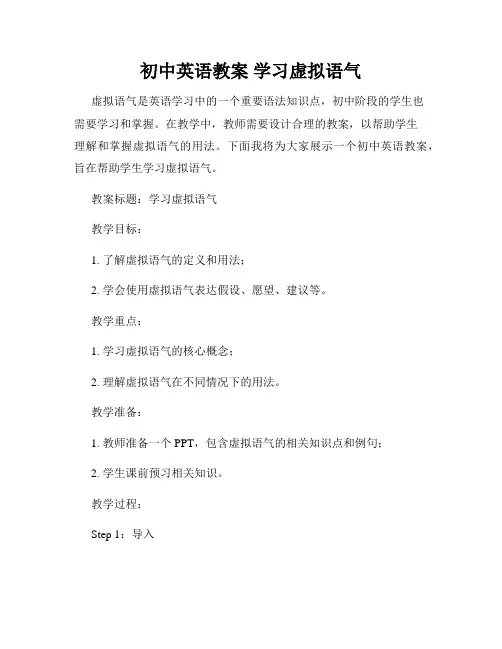
初中英语教案学习虚拟语气虚拟语气是英语学习中的一个重要语法知识点,初中阶段的学生也需要学习和掌握。
在教学中,教师需要设计合理的教案,以帮助学生理解和掌握虚拟语气的用法。
下面我将为大家展示一个初中英语教案,旨在帮助学生学习虚拟语气。
教案标题:学习虚拟语气教学目标:1. 了解虚拟语气的定义和用法;2. 学会使用虚拟语气表达假设、愿望、建议等。
教学重点:1. 学习虚拟语气的核心概念;2. 理解虚拟语气在不同情况下的用法。
教学准备:1. 教师准备一个PPT,包含虚拟语气的相关知识点和例句;2. 学生课前预习相关知识。
教学过程:Step 1:导入教师通过举一个例子引入虚拟语气的概念,如:If I were a bird, I would fly in the sky.然后让学生思考,这句话表示了什么样的情况。
Step 2:概念解释教师在PPT上展示虚拟语气的定义:“虚拟语气是一种用来表达与事实相反、与现实相反或与过去事实相反的想法、假设、愿望等的语气。
”然后给出一些实例,学生跟读并尝试分析这些例句的情况。
Step 3:用法讲解教师通过PPT讲解虚拟语气在不同情况下的用法:1. 表达与现在事实相反的情况:If I were you, I would study harder.2. 表达与过去事实相反的情况:If she had studied, she would have passed the exam.3. 表达与现实相反的愿望:I wish I could travel around the world.4. 表达建议:It is important that he arrive on time.Step 4:练习教师设计一些练习题,让学生在书面和口头表达中使用虚拟语气,并相互检查纠正。
Step 5:巩固教师组织学生进行小组活动,让学生根据教材中的对话和情境,用虚拟语气编写一段对话或文章。
Step 6:总结教师借助PPT总结虚拟语气的用法和注意点,帮助学生对所学知识做一个归纳总结。
大学虚拟语气教案
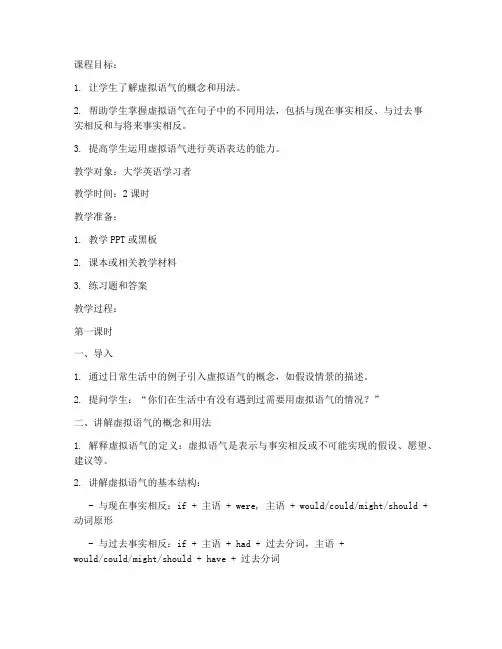
课程目标:1. 让学生了解虚拟语气的概念和用法。
2. 帮助学生掌握虚拟语气在句子中的不同用法,包括与现在事实相反、与过去事实相反和与将来事实相反。
3. 提高学生运用虚拟语气进行英语表达的能力。
教学对象:大学英语学习者教学时间:2课时教学准备:1. 教学PPT或黑板2. 课本或相关教学材料3. 练习题和答案教学过程:第一课时一、导入1. 通过日常生活中的例子引入虚拟语气的概念,如假设情景的描述。
2. 提问学生:“你们在生活中有没有遇到过需要用虚拟语气的情况?”二、讲解虚拟语气的概念和用法1. 解释虚拟语气的定义:虚拟语气是表示与事实相反或不可能实现的假设、愿望、建议等。
2. 讲解虚拟语气的基本结构:- 与现在事实相反:if + 主语 + were, 主语 + would/could/might/should + 动词原形- 与过去事实相反:if + 主语 + had + 过去分词,主语 +would/could/might/should + have + 过去分词- 与将来事实相反:if + 主语 + were to/should + 动词原形,主语 + would/could/might/should + 动词原形三、示例讲解1. 展示几个虚拟语气的句子,并解释其含义。
2. 让学生尝试翻译句子,加深对虚拟语气用法的理解。
四、练习1. 让学生完成一些关于虚拟语气的练习题,巩固所学知识。
2. 教师解答学生疑问,纠正错误。
第二课时一、复习1. 复习上一节课所学的虚拟语气概念和用法。
2. 通过提问或小组讨论的方式,让学生回顾所学内容。
二、深入讲解虚拟语气在特定语境中的运用1. 讲解虚拟语气在条件状语从句、让步状语从句、结果状语从句和目的状语从句中的运用。
2. 通过具体例句,让学生理解虚拟语气在不同从句中的用法。
三、练习1. 让学生完成更多关于虚拟语气的练习题,包括不同语境下的虚拟语气运用。
2. 教师解答学生疑问,纠正错误。
高中虚拟语气获奖教案模板
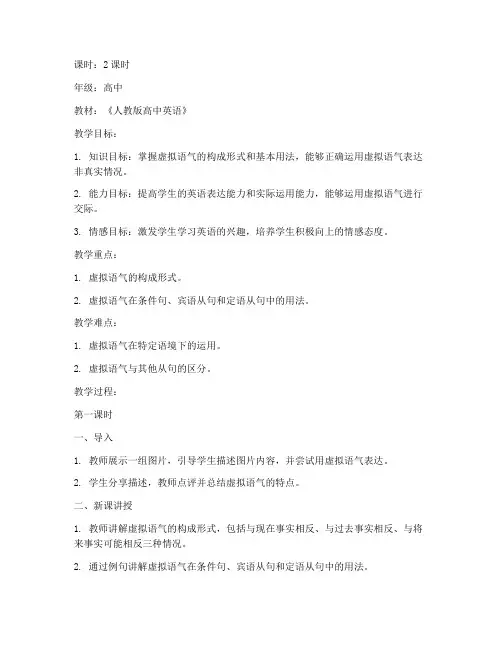
课时:2课时年级:高中教材:《人教版高中英语》教学目标:1. 知识目标:掌握虚拟语气的构成形式和基本用法,能够正确运用虚拟语气表达非真实情况。
2. 能力目标:提高学生的英语表达能力和实际运用能力,能够运用虚拟语气进行交际。
3. 情感目标:激发学生学习英语的兴趣,培养学生积极向上的情感态度。
教学重点:1. 虚拟语气的构成形式。
2. 虚拟语气在条件句、宾语从句和定语从句中的用法。
教学难点:1. 虚拟语气在特定语境下的运用。
2. 虚拟语气与其他从句的区分。
教学过程:第一课时一、导入1. 教师展示一组图片,引导学生描述图片内容,并尝试用虚拟语气表达。
2. 学生分享描述,教师点评并总结虚拟语气的特点。
二、新课讲授1. 教师讲解虚拟语气的构成形式,包括与现在事实相反、与过去事实相反、与将来事实可能相反三种情况。
2. 通过例句讲解虚拟语气在条件句、宾语从句和定语从句中的用法。
3. 学生跟读并模仿例句,巩固所学知识。
三、课堂练习1. 学生完成教材上的相关练习,巩固所学知识。
2. 教师讲解练习中的难点,帮助学生理解和掌握。
四、拓展延伸1. 教师引导学生运用虚拟语气进行情景对话,提高实际运用能力。
2. 学生分组进行角色扮演,模拟实际交际场景。
五、课堂小结1. 教师总结本节课所学内容,强调虚拟语气的构成形式和用法。
2. 学生分享学习心得,提出疑问。
第二课时一、复习导入1. 教师提问上节课所学内容,检查学生对虚拟语气的掌握情况。
2. 学生回答问题,教师点评并总结。
二、新课讲授1. 教师讲解虚拟语气在特定语境下的运用,如虚拟语气在感叹句、祈使句、反意疑问句中的用法。
2. 通过例句讲解虚拟语气与其他从句的区分。
三、课堂练习1. 学生完成教材上的相关练习,巩固所学知识。
2. 教师讲解练习中的难点,帮助学生理解和掌握。
四、拓展延伸1. 教师引导学生运用虚拟语气进行写作练习,提高写作能力。
2. 学生展示自己的作品,教师点评并给予建议。
虚拟语气教案
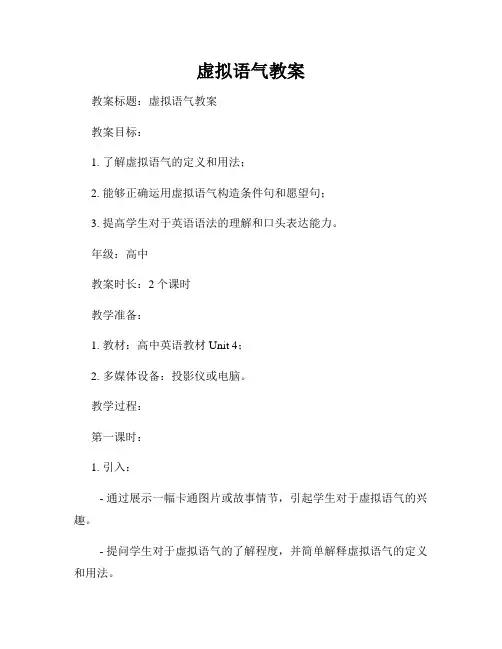
虚拟语气教案教案标题:虚拟语气教案教案目标:1. 了解虚拟语气的定义和用法;2. 能够正确运用虚拟语气构造条件句和愿望句;3. 提高学生对于英语语法的理解和口头表达能力。
年级:高中教案时长:2个课时教学准备:1. 教材:高中英语教材 Unit 4;2. 多媒体设备:投影仪或电脑。
教学过程:第一课时:1. 引入:- 通过展示一幅卡通图片或故事情节,引起学生对于虚拟语气的兴趣。
- 提问学生对于虚拟语气的了解程度,并简单解释虚拟语气的定义和用法。
2. 概念讲解:- 通过多媒体展示虚拟语气的几种常见情况,如条件句和愿望句。
- 解释虚拟语气的构造和使用规则,并提供一些例子帮助学生理解。
3. 条件句的虚拟语气:- 解释虚拟语气在条件句中的用法,如表示与事实相反的假设或不可能实现的情况。
- 指导学生通过填空或改写句子的练习,掌握虚拟语气在条件句中的正确用法。
4. 愿望句的虚拟语气:- 解释虚拟语气在愿望句中的用法,如表达不可能实现的愿望或遥远的未来。
- 给学生提供几个练习,帮助他们熟练使用虚拟语气来构造愿望句。
第二课时:1. 复习:- 对于上一课时所学的条件句和愿望句的虚拟语气进行复习。
- 通过多媒体展示一些练习题,让学生回顾并巩固所学内容。
2. 拓展应用:- 提供更多的虚拟语气练习题,包括其他用途如建议、命令等。
- 鼓励学生在小组或全班进行对话练习,运用虚拟语气表达自己的观点和建议。
3. 综合应用:- 分发一篇短文给学生,让他们根据指导进行改写,运用虚拟语气。
- 学生完成改写后,进行小组讨论,分享自己的改写结果和理由。
4. 总结:- 回顾和总结虚拟语气的用法和构造规则,并提醒学生注意虚拟语气的使用时机。
- 复习本节课所学内容,解答学生的疑惑,确保学生对于虚拟语气有准确的理解。
教学反馈:1. 在课堂上观察学生的参与程度和理解情况,及时给予指导和反馈。
2. 给学生布置家庭作业,要求他们运用虚拟语气完成一篇短文或对话练习。
高中英语《虚拟语气》教案
高中英语《虚拟语气》教案一、教学目标1.了解虚拟语气的基本概念和形式;2.掌握虚拟语气的常见用法;3.能够正确运用虚拟语气来表达假设、愿望、建议等情态。
二、教学重点1.虚拟语气的基本概念和形式;2.虚拟语气的常见用法。
三、教学难点1.虚拟语气的用法区分;2.虚拟语气在实际语境中的运用。
四、教学过程1.导入通过出示几个虚拟语气的例句,引起学生对虚拟语气的兴趣,并让学生思考这些句子中的语气是怎样的。
2.了解概念向学生解释虚拟语气的概念:虚拟语气是一种表示假设、愿望、建议等情态的语气。
注意着重强调虚拟语气与现实情况不符。
3.掌握形式3.1 虚拟语气的过去式形式与现在事实相反:主语+动词过去式例如:If I were you, I would go to the party.(要是我是你,我就去参加这个派对。
)3.2 虚拟语气的基本形式与现在事实相反:主语+should/could/might/would+动词原形例如:If I had enough money, I would buy a car.(如果我有足够的钱,我就会买一辆车。
)4.常见用法4.1 表达假设用在if条件句中,表示与现在事实相反的假设情况。
例如:If he were here, he would help us.(如果他在这里,他会帮我们的。
)4.2 表达愿望用在动词后面,表示对未来或现在不可能实现的愿望。
例如:I wish I were a bird.(我希望我是一只鸟。
)4.3 表达建议用在虚拟条件下的建议句中,表示有礼貌的劝告或建议。
例如:You should study hard so that you could pass the exam.(你应该努力学习,这样你才能通过考试。
)5.运用实践让学生在实际交际中运用虚拟语气,例如:假设你是班长,你可以用虚拟语气来向同学提出建议。
6.归纳总结向学生提供一张虚拟语气的总结表格,让学生归纳虚拟语气的基本概念、形式和常见用法,并帮助学生理清思路。
英语虚拟语气教案
英语虚拟语气教案一、教学目标1.让学生理解虚拟语气的概念和用法。
2.培养学生运用虚拟语气进行交流和表达的能力。
3.提高学生对英语语法知识的掌握。
二、教学内容1.虚拟语气的定义和分类2.虚拟语气的用法及句型结构3.虚拟语气在日常生活中的应用三、教学重点与难点1.重点:虚拟语气的用法及句型结构2.难点:虚拟语气的运用和实际情景的创设四、教学过程1.导入(1)通过一个有趣的故事引入虚拟语气的概念,激发学生的兴趣。
(2)让学生猜测故事中的虚拟语气句子,并引导学生思考虚拟语气的作用。
2.理解虚拟语气的定义和分类(1)用简洁明了的语言解释虚拟语气的定义。
(2)通过示例句,让学生了解虚拟语气的分类:与现在事实相反的虚拟、与过去事实相反的虚拟、与将来事实相反的虚拟。
3.学习虚拟语气的用法及句型结构(1)分别讲解三种虚拟语气的用法和句型结构。
(2)通过练习,让学生掌握虚拟语气的用法。
4.实践虚拟语气的应用(1)设计一些实际情景,让学生运用虚拟语气进行表达。
(2)让学生分组进行角色扮演,运用虚拟语气进行交流。
(2)通过练习,巩固学生对虚拟语气的掌握。
6.作业布置(1)让学生翻译一些含有虚拟语气的句子。
(2)让学生编写一段含有虚拟语气的对话或短文。
五、教学反思1.本节课通过生动的故事导入,激发了学生的学习兴趣。
2.在讲解虚拟语气的用法和句型结构时,注重理论与实践相结合,让学生在实际情景中运用虚拟语气。
3.通过分组练习和角色扮演,提高了学生的互动性和积极性。
4.作业布置有助于巩固学生对虚拟语气的掌握。
5.教学过程中,注意关注学生的反馈,及时调整教学方法和节奏。
六、教学评价1.课后对学生的学习效果进行评价,了解学生对虚拟语气的掌握程度。
2.通过作业和课堂表现,评价学生的参与度和积极性。
3.收集学生的意见和建议,不断改进教学方法,提高教学质量。
七、教学延伸1.进一步讲解虚拟语气的高级用法,如倒装句、强调句等。
2.结合实际生活,让学生学会在不同场景中运用虚拟语气。
英语虚拟语气教案
英语虚拟语气教案教案标题:引导学生理解和运用英语虚拟语气教案目标:1. 通过本课教学,学生将能够理解英语虚拟语气的概念和用法。
2. 学生将能够正确运用英语虚拟语气来表达假设、建议、愿望等情态。
教学重点:1. 英语虚拟语气的概念和用法。
2. 虚拟语气在不同情境中的正确运用。
教学难点:1. 学生能够准确理解和运用英语虚拟语气。
2. 学生能够在不同情境中灵活运用虚拟语气。
教学准备:1. 教师准备一份包含虚拟语气用法的教学材料。
2. 准备一些练习题和活动,以帮助学生巩固所学内容。
教学过程:Step 1: 引入虚拟语气概念(10分钟)1. 教师向学生解释虚拟语气的概念,即表示与事实相反或假设的语气。
2. 教师提供一些例句,让学生尝试理解虚拟语气的用法。
Step 2: 虚拟语气的用法(15分钟)1. 教师向学生介绍虚拟语气在不同情境中的用法,如表示假设、建议、愿望等。
2. 教师提供一些具体例句,让学生分析其中的虚拟语气用法。
Step 3: 虚拟语气练习(20分钟)1. 教师提供一些练习题,让学生运用所学的虚拟语气知识进行填空或改错。
2. 学生可以分组或个人完成练习,教师逐一检查并给予反馈。
Step 4: 虚拟语气活动(15分钟)1. 教师组织学生进行小组活动,让学生用虚拟语气编写一段对话或情景剧。
2. 每个小组表演完后,其他学生可以提出改进意见和建议。
Step 5: 总结与评价(10分钟)1. 教师与学生一起总结所学的虚拟语气知识,并回答学生提出的问题。
2. 教师对学生的表现进行评价,并鼓励学生在以后的学习中继续运用虚拟语气。
教学延伸:1. 学生可以自主查找更多虚拟语气的例句和练习题进行巩固。
2. 学生可以运用虚拟语气写一篇短文,表达自己的假设、建议或愿望。
教学资源:1. 虚拟语气的教学材料。
2. 练习题和活动相关的教学材料。
3. 小组活动的指导表格。
教学评估:1. 教师观察学生在课堂上对虚拟语气的理解和运用情况。
高中虚拟语气教案
高中虚拟语气教案一、教学目标1. 让学生理解虚拟语气的概念和用法。
2. 培养学生正确运用虚拟语气进行表达的能力。
3. 提高学生对英语语法的兴趣和积极性。
二、教学内容1. 虚拟语气的定义和分类2. 虚拟语气的构成和用法3. 虚拟语气在不同语境中的应用三、教学重点与难点1. 虚拟语气的定义和分类2. 虚拟语气的构成和用法3. 虚拟语气在条件句和愿望句中的应用四、教学方法1. 讲授法:讲解虚拟语气的定义、分类和构成。
2. 案例分析法:分析典型例句,展示虚拟语气的用法。
3. 练习法:设计练习题,让学生巩固所学内容。
4. 小组讨论法:分组讨论虚拟语气在实际语境中的应用。
五、教学过程1. 导入:引导学生思考虚拟语气的概念,激发学习兴趣。
2. 讲解:详细讲解虚拟语气的定义、分类和构成。
3. 示例:展示典型例句,分析虚拟语气的用法。
4. 练习:设计练习题,让学生进行虚拟语气的实际操作。
5. 讨论:分组讨论虚拟语气在条件句和愿望句中的应用。
6. 总结:回顾本节课所学内容,强调虚拟语气的关键点。
7. 作业:布置作业,巩固虚拟语气的运用。
六、教学评估1. 课堂问答:检查学生对虚拟语气概念的理解和运用。
2. 练习题:评估学生对虚拟语气构成和用法的掌握。
3. 小组讨论:观察学生在讨论中的表现,了解他们对虚拟语气的实际应用能力。
七、教学拓展1. 虚拟语气的其他用法:介绍虚拟语气在其他语境中的应用,如虚拟条件句、虚拟倒装句等。
2. 文化背景:讲解虚拟语气在英语文化中的特殊用法和表达习惯。
3. 实践任务:让学生运用虚拟语气编写一段对话或短文,展示其实际应用能力。
八、教学反思1. 总结本节课的教学效果,反思教学方法的适用性。
2. 分析学生的学习情况,针对性地调整教学策略。
3. 搜集学生反馈,了解他们对虚拟语气的掌握程度,为后续教学提供参考。
九、课后作业1. 复习虚拟语气的定义、分类和构成。
2. 完成课后练习题,巩固虚拟语气的运用。
- 1、下载文档前请自行甄别文档内容的完整性,平台不提供额外的编辑、内容补充、找答案等附加服务。
- 2、"仅部分预览"的文档,不可在线预览部分如存在完整性等问题,可反馈申请退款(可完整预览的文档不适用该条件!)。
- 3、如文档侵犯您的权益,请联系客服反馈,我们会尽快为您处理(人工客服工作时间:9:00-18:30)。
虚拟语气语法教案
Teaching Plan 2
Teaching content: unreal conditional
Target students: Grade 11 students (aged 16-17)
Teaching objectives:
By the end of the lesson, students will be able to
1. grasp the usage of the unreal conditionals;
2. use unreal conditionals to translate sentences and write a passage;
3. use unreal conditionals in different situations;
Teaching methodology:
Task-based learning approach and student-centered teaching approach, cognitive approach, etc
Teaching aids:
Multi-media, blackboard, and overhead projector
Teaching procedures:
I. Warming-up (4 mins)
1. Make the Ss enjoy a famous English song and fullfill the blanks.
Beyonce Knowles —— If I Were A Boy
If I were a boy
Even just for a day
I'd roll outta bed in the morning
And ______ on what I wanted then go
Drink beer with the guys
And _____ after girls
I’d _______ it with who I wanted
And I’d never get ________ for it.
Cause they’d ______ up for me.
If I were a boy
I think I could __________
How it feels to love a girl
I ______ I’d be a better man.
I’d listen to her
Cause I know how it _______
When you lose the one you wanted
Cause he’s taken you for _______
And everything you had got destroyed
……
2. Brainstorming: What’s your understanding of the song?
II. Grammar (25 mins)
1. Sentence appreciation: choose 2-3 sentences from the song, such as:
1) If I were a boy, I would put myself first and make the rules as I go,
bec ause I know that she’d be faithful, waiting for me to come home.
2) (This is opposite to the present situation)
3) If Lady Gaga were to come/ should come to our school, I would invite
her to have dinner in our school dining room.
(This is opposite to the future situation)
4) If it had rained much in south-east, people there would have had a
good harvest.
(This is opposite to the past situation)
Conclude: We use unreal conditional to express imagination, something that is unlikely to happen, unreal event or situation.
2. Analyse the basic forms of unreal conditional.
3. Practice
1) Multiple choice
(1). If you ______ to see Mary, what would you tell her?
A. are
B. will be going
C. must
D. were
(2). I would have said “Hello” to him if I ______ your brother.
A. could see
B. had seen
C. will see
D. will have seen
(3). If you had wanted to buy a record, what ________?
A. would you buy
B. had you bought
C. would you have bought
D. would you be buying
(4). If the tablets had dissolved, John ______.
A. would probably die
B. had probably died
C. probably would be died
D. would probably have died
(5). -----“I was so sorry to hear about Jack.”
-----“If he had made more friends here, he might ________.”
A. have stayed
B. have stay
C. stayed
D. stay
2) According to the three basic forms of unreal contional, create three
situations for Ss with different pictures and ask Ss to use unreal
conditional to describe each picture.
Examples:
(1) A: What would you want to do, if you had a Doraemon?
B: If I had a Doraemon, I would want to travel to the past.
(2) If Jack hadn’t won the ticket, he would not have got on the ship
Titanic.
III. Writing and presenting (16 mins)
1. Write a passage about 80 words with one of the following topics:
1) If I were clever enough, I __________________________
2) If I hadn’t done such a stupid thing, I _____________________
3) If Justin Bieber were to come to my home, I ___________________
2. Present their writings and peer review their work. (choose 2-3 groups to show their writings.)
3. Teacher’s reflection on their writing.
IV. Homework
Each student is required to revise unreal conditional and polish their writing.。
